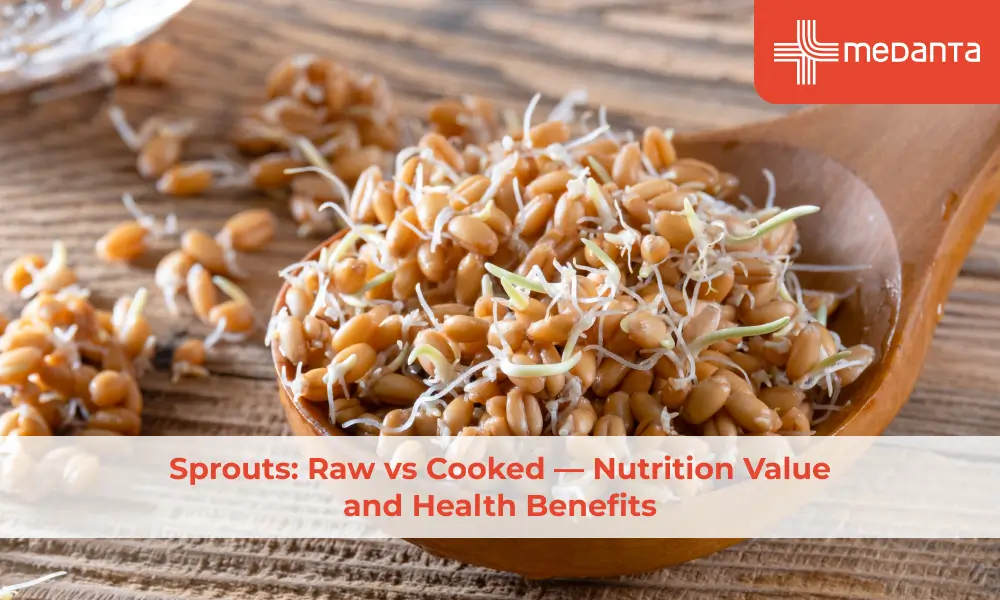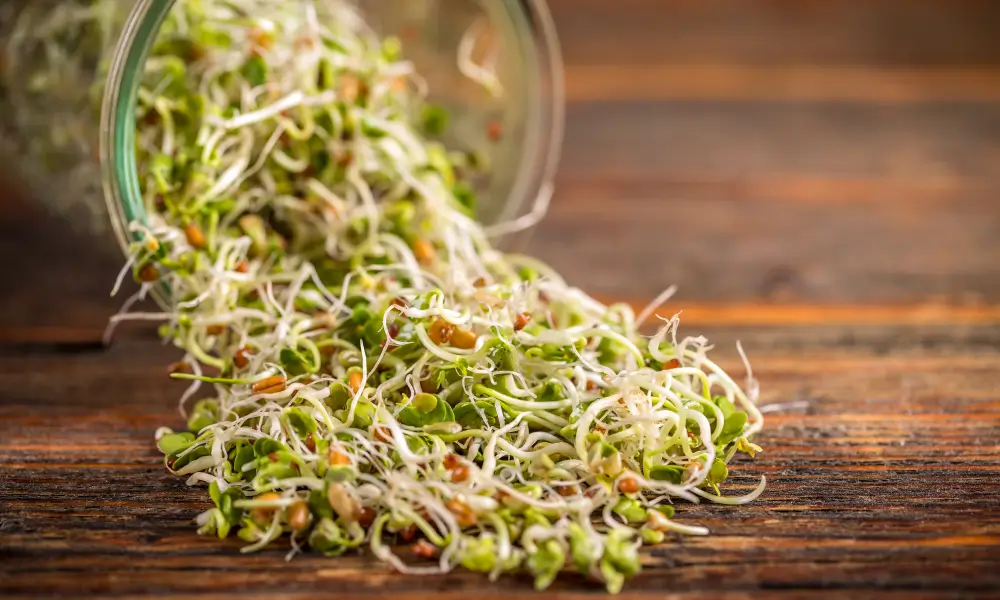Sprouts: Raw vs Cooked — Nutrition Value and Health Benefits

TABLE OF CONTENTS
Health enthusiasts often debate whether sprouts are best eaten raw or cooked. A single cup of sprouts provides a good amount of protein and carbohydrates while remaining low in calories — usually between 30 and 100 calories, depending on the type. However, since sprouting requires warm and humid conditions, it can also encourage the growth of harmful bacteria such as E. coli and Salmonella.
Sprouts Nutritional Value: What’s Inside Every Bite
Sprouts pack some of nature's most concentrated nutrition into tiny packages. These little germinated seeds are true health powerhouses. Their nutritional makeup changes based on whether you eat them raw or cooked.
Raw sprouts are full of enzymes that help your digestion and speed up metabolism. A 100g serving gives you:
30-40 calories
3-6g protein
6-8g carbohydrates
1.5-2g fibre
20-30mg vitamin C
15-20 IU vitamin A
15-30mcg vitamin K
The minerals in sprouts play a big role too. Your bones need manganese to develop properly, and phosphorus keeps your teeth strong. The sprouting process makes these minerals easier for your body to absorb compared to regular seeds or grains.
The way sprouts transform during germination makes them special. Complex carbs break down into simpler forms that digest easily. Your body can also use the protein better - great news if you follow a plant-based diet.
Raw and cooked sprouts each have their benefits. Cooking might lower some vitamin levels slightly, but it makes the sprouts easier to digest. You can choose either method based on what works best for your health goals.
Benefits of Eating Sprouts: Top 8 Health Perks Backed by Science
Science shows amazing health benefits you can get from sprouts. These young plants pack a powerful nutritional punch with impressive advantages (including but not limited to):
Health Benefit | Scientific Evidence |
Better Digestion | Sprouting can increase fiber content and improve its digestibility, supporting gut health and preventing constipation. |
Blood Sugar Control | Studies show sprouts can lower blood glucose levels through their antioxidant properties and reduce insulin resistance |
Better Heart Health | Research found significantly lower calcium deposits in the women's aortas who ate cruciferous sprouts daily |
Weight Management | Sprouts are low in calories but rich in protein, helping you feel full and control hunger |
Stronger Immunity | Sprouting makes plants richer in vitamin C, B-complex, and antioxidants that strengthen your immune system |
Skin Health | Vitamins C and E help curb oxidative stress and boost collagen production to improve your skin |
Detoxification | Sprouts' chlorophyll helps clean toxins from cells and the lymphatic system |
Mental Clarity | Berry and broccoli sprouts contain compounds that help brain function |
Benefits of Eating Sprouts Daily — How Much Is Safe & Optimal

Health experts suggest eating 1/2 to 2 cups (50-150g) of fresh sprouts daily. This amount gives you enough nutrients without overwhelming your digestion. Sprouting makes vitamins skyrocket - vitamin B1 jumps by 285%, vitamin B2 by 515%, and niacin by 256%.
Raw sprouts aren't for everyone though. Pregnant women, young children, older adults, and people with weak immune systems should cook their sprouts well.
10 Ways to Eat (Salads, Stir-Fries, Smoothies & More)
Preparation Method | Description |
Classic Sprout Salad | Mix with greens, colourful veggies, and a light dressing |
Sandwich Topping | Add some crunch to sandwiches or wraps with whole grain bread |
Stir-Fry Addition | Add soy sauce, ginger or lemon juice while stir-frying to enhance taste |
Smoothie Booster | Add different fruits (pineapple or apple) or spinach to make a nutrient-rich smoothie |
Soup Enhancement | Adding sprouts to any soup or broth enhances the taste as well as the nutritional value of the soup |
Toast Topper | Adding steamed sprouts to the avocado spread on your toast adds extra flavour and protein |
Curry Ingredient | Add to curries for more protein |
Homemade Hummus | Sprouted chickpeas are a great option for hummus |
Sprouted Baking | Baking goods of dried sprouted grain flour are incredibly nourishing and better for gluten sensitive people |
Pet Food Supplement | Mung bean and pea sprouts are a great nutritional source for your pets |
How to Sprout Safely at Home
Safety comes first with sprouting. Clean, filtered water works best for soaking and rinsing. You should rinse sprouts every 12 hours, or every 6 hours in warm weather. Don't let water collect in sprouting containers and make sure air can flow. Start by soaking seeds for at least 8 hours, then drain and rinse regularly. You can reduce food poisoning risk by cleaning seeds with pure vinegar for 15 minutes or a warm 3% hydrogen peroxide solution at 140°F for 5 minutes.
Conclusion
Sprouts are nutritional powerhouses. They give you amazing health benefits. You can take them in any way you want. Raw sprouts have active enzymes that help digestion, while cooking them makes them safer without losing too many nutrients. The cooking process actually makes some nutrients easier to absorb and kills harmful bacteria found in raw varieties.
Either way they deserve a spot on your plate. These tiny nutritional giants are incredibly versatile. You can add them to salads, sandwiches, stir fries or smoothies to improve both taste and nutrition in your everyday meals. Their vitamin & mineral content helps everything from your digestion to your heart health. Try your culinary skills in cooking different varieties with different methods and you can find the form you like best. Your body will thank you for adding these nutritional gems to your meals.
FAQs
Are sprouts more nutritious raw or cooked?
Raw versus cooked sprouts each has its benefits. Raw ones keep more live enzymes and some vitamins but might not be safe to eat. Cooking makes them easier to digest and safer to eat. You can steam them at 160°F to kill harmful bacteria while keeping most nutrients intact. So, cooking makes sprouts both safer and easier for your body to absorb nutrients.
What is the sprouts' nutritional value per 100 g?
Sprouts pack a lot of nutrition in a tiny package. A 100g serving gives you:
30-40 calories
3-6g protein
6-8g carbohydrates
1.5-2g fibre
You'll find plenty of vitamin C to boost your immune system, and vitamin K that helps blood clot and keeps bones healthy. These tiny plants also give you lots of folate, which your body needs to make new cells.
What are the benefits of eating sprouts daily?
Eating 1/2 to 1 cup of sprouts daily can boost your health. They help digestion with their fibre content, make your immune system stronger with vitamins C and A, help manage weight by making you feel full, and support muscle growth with protein.
Do sprouts help skin health and how?
Sprouts can make your skin look better thanks to their antioxidants. Their omega-3 fatty acids reduce skin irritations and acne. Vitamin C helps make collagen that keeps skin elastic. They also help clear toxins from your body, which gives you clearer skin.
What are the best uses of sprouts in meals?
You can add sprouts to your meals in many ways:
Mix them in fresh salads with lemon dressing
Add crunch to sandwiches and wraps
Toss them in stir-fries
Blend into smoothies
Drop them in soups right before serving
How can I build a safe sprouts diet for weight loss or muscle gain?
To lose weight, eat sprouts' high-fibre, low-calorie goodness for breakfast or as snacks. For muscles, pick protein-rich options like lentil sprouts (9g/100g) and soybean sprouts (13g/100g). Mix them with other protein foods for complete nutrition.
How do I reduce food poisoning risk when eating raw sprouts?
Stay safe by following these steps:
Buy sprouts that look fresh and are kept cold
Keep them below 8°C
Clean your hands before touching them
Give them a good rinse before eating
Some people should eat them cooked (kids, older adults, pregnant women)






